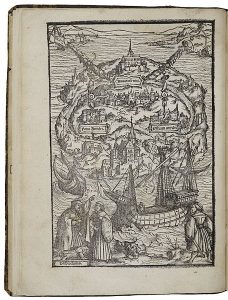Podcast episode
March 18, 2018
Episode 29: Otherworlds, Inner Worlds, and Utopias


Plato’s Republic is an immensely complex work, which has inspired perhaps more esoteric interpretation than any other Platonic dialogue. One of its striking features is Socrates’ description of an ideal state, which is, among other things, the first utopia in western literature. But what do we mean by ‘utopia’, exactly? And how would a utopia, assuming we can define it, differ from other imagined places we encounter in western esotericism?
In this episode we take Plato’s ideal state as a starting-point for talking about utopias, otherworlds, and inner worlds, three types of place which are … well, whatever they are, they’re not the everyday world. And they are mainstays of western esotericism. Join us for a series of journeys to lands which don’t exist, but which may be more real than the place you’re sitting right now.
Works Discussed in this Episode:
- Anonymous, 1700. Annus Sophiæ Jubilæus, or The Sophick Constitution. A. Baldwin, London. This alchemical utopia can be read online here.
- Campanella, T., 1623. Civitas solis. Tobias Adami, Frankfurt (first Latin printed version). An online text of the earliest known MS of the book can be found here on wikisource.
- Fourier, C. Beecher, J. & Bienvenu, R. (Ed.), 1971. The Utopian Vision of Charles Fourier: Selected Texts on Work, Love, and Passionate Attraction. Beacon Press, Boston.
- John of Patmos’s descriptions of the heavenly Jerusalem can be found at Rev 3:12 and 21:2.
- More, T., 1516. Libellus vere aureus, nec minus salutaris quam festivus, de optimo rei publicae statu deque nova insula Utopia. More, Leuven.
- Orwell, G., 2013. Nineteen Eighty-Four. Penguin, London.
- Popper, K., 2013. The Open Society and its Enemies. Princeton University Press, Princeton, NJ.
- Proclus, W. Kroll (Ed.), 1965. In Platonis rem publicam commentarii. Hakkert, Amsterdam.
Recommended Reading:
- Carey, J. (Ed.), 1999. The Faber Book of Utopias. Faber and Faber, London.
- Mallory, J. P. & Adams, D. Q. (Ed.), 2006. The Oxford Introduction to Proto-Indo-European and the Proto-Indo-European World. Oxford University Press, Oxford. Good introduction to common otherworld-imagery across Indo-European cultures; commonalities include a guardian hound and, weirdly, an association with apples.
- Sargent, L. T., 1979. British and American Utopian Literature, 1516-1975: An Annotated Bibliography. G.K. Hall, Boston.
Themes
Atlantis, Katabasis, Otherworld Journeys, Otherworlds, Plato, Utopia


Bernie Lewin
September 25, 2019
Wow, there have been so many imaginary worlds! The narrower street definition of ‘utopia’ might still remain useful, i.e., where an ideal illustrates a social reform agenda. Thus, we might find or imagine a Puritan utopia, Brexit utopia, Green utopia, Marxist utopia or other news from nowhere. Under this narrower definition one may wish to add Francis Bacon’s ‘New Atlantis’. Its House of Solomon — an academy for the study not of the Creator but only of his works and creatures — was an esoteric invention by an esoteric writer that would live on as the model for an institution set to abolish esotericism.
Earl Fontainelle
September 26, 2019
That’s a really nice point about More’s House of Solomon.
Calliope Irving
November 4, 2021
my most favourite episode so far!!!
Travis Wade ZINN
February 4, 2023
Excellent episode – really enjoyed it!